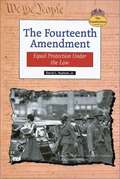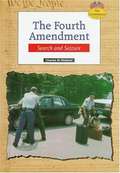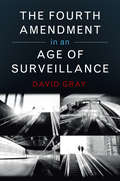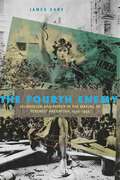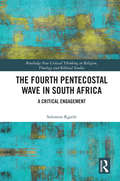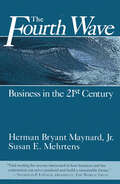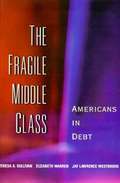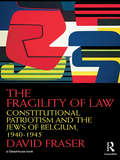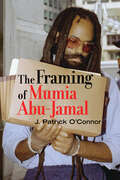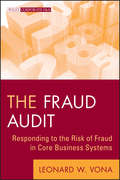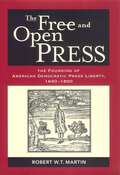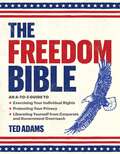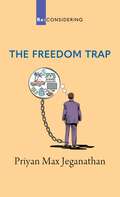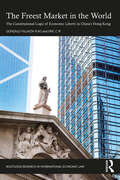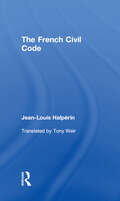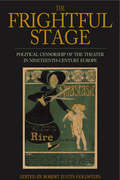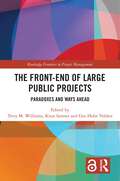- Table View
- List View
The Four Virtues
by Tobin HartIn a world with greater knowledge, more advanced technology, and more groundbreaking innovation than ever at our fingertips, we are still looking to find our way. We are still searching for that essential insight on how to lead a really good life. By drawing from across tradition and time, from neuroscience to ancient wisdom, Tobin Hart reveals that we all possess four essential virtues--Presence, Heart, Wisdom, Creation--that help us to build, balance, and integrate our psychological and spiritual life on earth. While these virtues may be universal, the way they live in each of us is unique. With the Spiritual Assessment Matrix (SAM) and expert practices and tools, this highly accessible, thought-provoking guide shows us how to grow and activate these powers from the inside out. When in balance, these four virtues serve as a field guide to the inner life, bringing you heart and wisdom as well as helping you recognize beauty, rekindle awe, and find your own voice.hether religious or secular--looking to live by a contemporary set of ethics to frame their self-development and happiness. Highly accessible, thought provoking, and interactive, The Four Virtues provides a groundbreaking way to engage and flourish in life.
The Fourteenth Amendment
by David L. HudsonIn The Fourteenth Amendment: Equal Protection Under the Law, author David L. Hudson, Jr., explores the significance of the Fourteenth Amendment through the country's history and legal cases. He discusses why there was a need for this amendment, how it was created, and fully explains the major sections and clauses. This amendment forever changed Constitutional law and will continue to have an impact on legal cases in the future.
The Fourth Amendment
by Charles M. WettererShows how the Fourth Amendment of the United States Constitution has been historically interpreted by the judicial system and presents cases which illustrate how it is currently being applied.
The Fourth Amendment in an Age of Surveillance
by David GrayThe Fourth Amendment is facing a crisis. New and emerging surveillance technologies allow government agents to track us wherever we go, to monitor our activities online and offline, and to gather massive amounts of information relating to our financial transactions, communications, and social contacts. In addition, traditional police methods like stop-and-frisk have grown out of control, subjecting hundreds of thousands of innocent citizens to routine searches and seizures. In this work, David Gray uncovers the original meaning of the Fourth Amendment to reveal how its historical guarantees of collective security against threats of 'unreasonable searches and seizures' can provide concrete solutions to the current crisis. This important work should be read by anyone concerned with the ongoing viability of one of the most important constitutional rights in an age of increasing government surveillance.
The Fourth Enemy: Journalism and Power in the Making of Peronist Argentina, 1930–1955
by James CaneThe rise of Juan Perón to power in Argentina in the 1940s is one of the most studied subjects in Argentine history. But no book before this has examined the role the Peronists’ struggle with the major commercial newspaper media played in the movement’s evolution, or what the resulting transformation of this industry meant for the normative and practical redefinition of the relationships among state, press, and public. In The Fourth Enemy, James Cane traces the violent confrontations, backroom deals, and legal actions that allowed Juan Domingo Perón to convert Latin America’s most vibrant commercial newspaper industry into the region’s largest state-dominated media empire. An interdisciplinary study drawing from labor history, communication studies, and the history of ideas, this book shows how decades-old conflicts within the newspaper industry helped shape not just the social crises from which Peronism emerged, but the very nature of the Peronist experiment as well.
The Fourth Enemy: Journalism and Power in the Making of Peronist Argentina, 1930–1955
by James CaneThe rise of Juan Perón to power in Argentina in the 1940s is one of the most studied subjects in Argentine history. But no book before this has examined the role the Peronists’ struggle with the major commercial newspaper media played in the movement’s evolution, or what the resulting transformation of this industry meant for the normative and practical redefinition of the relationships among state, press, and public. In The Fourth Enemy, James Cane traces the violent confrontations, backroom deals, and legal actions that allowed Juan Domingo Perón to convert Latin America’s most vibrant commercial newspaper industry into the region’s largest state-dominated media empire. An interdisciplinary study drawing from labor history, communication studies, and the history of ideas, this book shows how decades-old conflicts within the newspaper industry helped shape not just the social crises from which Peronism emerged, but the very nature of the Peronist experiment as well.
The Fourth Industrial Revolution and Its Impact on Ethics: Solving the Challenges of the Agenda 2030 (Sustainable Finance)
by Karen Wendt Katharina MillerThis book tackles the ethical problems of the “Fourth Industrial Revolution” (4IR) and offers readers an overview of the ethical challenges connected to Artificial Intelligence (AI), encryption and the finance industry. It specifically focuses on the situation of females in these industries, from women lawyers, judges, attorneys-at-law, investors and bankers, to portfolio managers, solicitors and civil servants. As the 4IR is more than “just” a technology-driven transformation, this book is a call to policymakers and business leaders to harness new technologies in order to create a more inclusive, human-centered future. It offers many practical cases of proactive change agents, and offers solutions to the ethical challenges in connection with implementing revolutionary disruptive products that often eliminate the intermediary. In addition, the book addresses sustainable finance in startups. In this context, education, training, agility and life-long learning in financial literacy are some of the key solutions highlighted here. The respective contributors supply a diverse range of perspectives, so as to promote a multi-stakeholder approach.
The Fourth Pentecostal Wave in South Africa: A Critical Engagement (Routledge New Critical Thinking in Religion, Theology and Biblical Studies)
by Solomon KgatleThis book critically examines contemporary Pentecostalism in South Africa and its influence on some of the countries that surround it. Pentecostalism plays a significant role in the religious life of this region and so evaluating its impact is key to understanding how religion functions in Twenty-First Century Africa. Beginning with an overview of the roots of Pentecostalism in Southern Africa, the book moves on to identify a current "fourth" wave of this form of Christianity. It sets out the factors that have given rise to this movement and then offers the first academic evaluation of its theology and practice. Positive aspects as well as extreme or negative practices are all identified in order to give a balanced and nuanced assessment of this religious group and allow the reader to gain valuable insight into how it interacts with wider African society. This book is cutting-edge look at an emerging form of one of the fastest-growing religions in the world. It will, therefore, be of great use to scholars working in Pentecostalism, Theology, Religious Studies and African Religion as well as African Studies more generally.
The Fourth Wave: Business in the 21st Century
by Susan E. Mehrtens Herman MaynardApplying the concept of historical waves originally propounded by Alvin Toffler in The Third Wave, Herman Maynard and Susan Mehrtens look toward the next century and foresee a "fourth wave," an era of integration and responsibility far beyond Toffler's revolutionary description of third-wave postindustrial society. Whether we attain this stage of global well-being, however, will depend on how well our business institutions adapt and change. The Fourth Wave examines the ways business has changed in the second and third waves and must continue to change in the fourth. The changes concern the basics-how an institution is organized, how it defines wealth, how it relates to surrounding communities, how it responds to environmental needs, and how it takes part in the political process. Maynard and Mehrtens foresee a radically different future in which business principles, concern for the environment, personal integrity, and spiritual values are integrated. The authors also demonstrate the need for a new kind of leadership-managers and CEOs who embrace an attitude of global stewardship; who define their assets as ideas, information, creativity, and vision; and who strive for seamless boundaries between work and private lives for all employees.
The Fracturing of the American Corporate Elite
by Mark S. MizruchiIn the aftermath of a financial crisis marked by bank-friendly bailouts and loosening campaign finance restrictions, a chorus of critics warns that business leaders have too much influence over American politics. Mark Mizruchi worries about the ways they exert too little. The Fracturing of the American Corporate Elite advances the surprising argument that American CEOs, seemingly more powerful today than ever, have abrogated the key leadership role they once played in addressing national challenges, with grave consequences for American society. Following World War II, American business leaders observed an ethic of civic responsibility and enlightened self-interest. Steering a course of moderation and pragmatism, they accepted the legitimacy of organized labor and federal regulation of the economy and offered support, sometimes actively, as Congress passed legislation to build the interstate highway system, reduce discrimination in hiring, and provide a safety net for the elderly and needy. In the 1970s, however, faced with inflation, foreign competition, and growing public criticism, corporate leaders became increasingly confrontational with labor and government. As they succeeded in taming their opponents, business leaders paradoxically undermined their ability to act collectively. The acquisition wave of the 1980s created further pressures to focus on shareholder value and short-term gain rather than long-term problems facing their country. Todayâe(tm)s corporate elite is a fragmented, ineffectual group that is unwilling to tackle the big issues, despite unprecedented wealth and political clout. Mizruchiâe(tm)s sobering assessment of the dissolution of Americaâe(tm)s business class helps explain the polarization and gridlock that stifle U. S. politics.
The Fragile Middle Class: Americans in Debt
by Elizabeth Warren Teresa A. Sullivan Jay Lawrence WestbrookThis book is about the middle class as viewed through the lens of bankruptcy. Since 1997, the number of American families filing for federal bankruptcy annually has exceeded one million. By most measures, those who file are members of the middle class -- a group that has long provided stability and vitality for the American economic system. This raises the troubling question: why, during the most remarkable period of prosperity in our history, are unprecedented numbers of Americans encountering such serious financial trouble?The authors of this important book analyze court records and demographic data on thousands of bankruptcy cases, as well as debtors' own poignant accounts of the reasons for their bankruptcies. For many middle-class Americans, the findings show, financial stability is fragile -- almost any setback can be disastrous. The erosion of job stability, divorce and family instability, the visible and invisible costs of medical care, the burden of home ownership, and the staggering weight of consumer debt financed with plastic combine to threaten the financial security of growing numbers of middle-class families. The authors view the bankruptcy process in the light of changing cultural and economic factors and consider what this may signify for the future of a large, secure, and dynamic middle class.
The Fragility of Goodness: Luck and Ethics in Greek Tragedy and Philosophy
by Martha C. NussbaumThis book is a study of ancient views about "moral luck. " It examines the fundamental ethical problem that many of the valued constituents of a well-lived life are vulnerable to factors outside a person's control, and asks how this affects our appraisal of persons and their lives. The Greeks made a profound contribution to these questions, yet neither the problems nor the Greek views of them have received the attention they deserve. This updated edition contains a new preface.
The Fragility of Law: Constitutional Patriotism and the Jews of Belgium, 1940–1945
by David FraserThe Fragility of Law examines the ways in which, during the Second World War, the Belgian government and judicial structure became implicated in the identification, exclusion and killing of its Jewish residents, and in the theft - through Aryanization - of Jewish property. David Fraser demonstrates how a series of political and legal compromises meant that the infrastructure for antisemitic persecutions and ultimately the deaths of thousands of Belgian Jews was Belgian. Based on extensive archival research in Belgium, France, the United States and Israel, The Fragility of Law offers the first detailed exploration in English of this intriguing and virtually unexplored episode of Holocaust history. Belgian legal officials did not hesitate to invoke the provisions of international law found in the Hague Convention and those guarantees of individual freedom found in the national Constitution to oppose the demands of the German Occupying Authority. However, they remained largely silent when anti-Jewish persecution was at stake. Indeed, despite the 2007 official report of expert historians on Belgian state collaboration in the persecution of the country’s Jewish population, the mythology of "passive collaboration" which has dominated Belgian historiography and accounts of the Holocaust in that country, must be radically rethought.
The Framing of Mumia Abu-Jamal
by J. Patrick O'ConnorMumia Abu-Jamal--the most famous death-row inmate in the United States--was sentenced to death in 1982 for allegedly killing police officer Daniel Faulkner. Using the preponderance of evidence to establish that Faulkner shot Abu-Jamal as he approached him and that a passenger in Abu-Jamal's brother's car, Kenneth Freeman, then killed Faulkner, this study convincingly shows how the Philadelphia Police Department and District Attorney's Office framed Abu-Jamal for Faulkner's killing. In addition, unlike any other book or article on this subject, it describes the overarching role in the case that then-mayor Frank Rizzo and a small, radical, back-to-nature cult called MOVE played.
The Frankfurt School and the Challenge of Fascism: An Intellectual and Philosophical Reconstruction
by Claudio CorradettiFascism is a well-defined historical phenomenon, but its political-ideological offshoots have extended into today's democracies. How should we understand the mimetic and dissimulating capacity of fascism? Starting from the analyses of the exponents of the first Frankfurt School in their rethinking of the Marxian relationship of structure and superstructure, this study considers how fascism may be defined as a specific organization of power together with a form of economic planning accompanied by a masochistic propensity to power. Drawing on archival research at the Horkheimer and Marcuse Archive in Frankfurt, the author guides us through unpublished documents of the Institute of Social Research in the years 1938-1939 concerning the plan to formulate "a theory" on fascism. This was never produced as a single work, allowing space instead to the flourishing of different contributions. The objective of this book is to provide an internal systemic reading of fascism, finding points of mutual integration among critical theorists whenever possible while revealing irreconcilable divergencies when necessary. This topical book will be of interest to academics and researchers working in the areas of philosophy, the history of ideas, legal philosophy, critical theory, economics and political science.
The Fraud Audit
by Leonard W. VonaEssential guidance for creation of an effective fraud audit program in core business systems The Association of Certified Fraud Examiners has reported that U. S. businesses lose up to $4 billion annually due to fraud and abuse. Discover fraud within your business before yours becomes another business fraud statistic. The Fraud Audit provides a proven fraud methodology that allows auditors to discover fraud versus investigating it. Explains how to create a fraud audit program Shows auditors how to locate fraud through the use of data mining Focuses on a proven methodology that has actually detected fraudulent transactions Take a look inside for essential guidance for fraud discovery within specific corporate F&A functions, such as disbursement, procurement, payroll, revenue misstatement, inventory, journal entries, and management override.
The Free Exercise of Religion in America: Its Original Constitutional Meaning
by Ellis M. WestThis book explains the original meaning of the two religion clauses of the First Amendment: “Congress shall make no law [1] respecting an establishment of religion or [2] prohibiting the free exercise thereof.” As the book shows, both clauses were intended to protect the free exercise of religion or religious freedom. West shows the position taken by early Americans on four issues: (1) the general meaning of the “free exercise of religion,” including whether it is different from the meaning of “no establishment of religion”; (2) whether the free exercise of religion may be intentionally and directly limited, and if so, under what circumstances; (3) whether laws regulating temporal matters that also have a religious sanction violate the free exercise of religion; and (4) whether the free exercise of religion gives persons a right to be exempt from obeying valid civil laws that unintentionally and indirectly make it difficult or impossible to practice their religion in some way. A definitive work on the subject and a major contribution to the field of constitutional law and history, this volume is key to a better understanding of the ongoing constitutional adjudication based on the religion clauses of the First Amendment.
The Free and Open Press: The Founding of American Democratic Press Liberty
by Robert W. MartinThe current, heated debates over hate speech and pornography were preceded by the equally contentious debates over the "free and open press" in the seventeenth and eighteenth centuries. Thus far little scholarly attention has been focused on the development of the concept of political press freedom even though it is a form of civil liberty that was pioneered in the United States. But the establishment of press liberty had implications that reached far beyond mere free speech. In this groundbreaking work, Robert Martin demonstrates that the history of the "free and open press" is in many ways the story of the emergence and first real expansions of the early American public sphere and civil society itself. Through a careful analysis of early libel law, the state and federal constitutions, and the Sedition Act crisis Martin shows how the development of constitutionalism and civil liberties were bound up in the discussion of the "free and open press." Finally, this book is a study of early American political thought and democratic theory, as seen through the revealing window provided by press liberty discourse. It speaks to broad audiences concerned with the public square, the history of the book, free press history, contemporary free expression controversies, legal history, and conceptual history.
The Freedom Bible: An A-to-Z Guide to Exercising Your Individual Rights, Protecting Your Privacy, Liberating Yourself from Corporate and Government Overreach
by Ted AdamsLearn How to Protect Your Family&’s Freedom!Freedom is the foundation on which America was born and continues to thrive. If you believe in the strength of freedom as more than an ideal, you can find smart ways to exercise it in all parts of your life! The Freedom Bible is your A-to-Z guide to knowing your individual rights and seeking more control and freedom through the decisions you face every day.Own healthcare decisions for you and your familyMake choices that direct your dollars where you want—for example, made in America, not overseasKnow your options to challenge governing boards—from home ownership associations to school boardsReduce your reliance on &“the grid&”Escape the invasiveness of all kinds of technologyGuard your privacy and free speech on social mediaAnd much more!Get freedom from…· Big Government· Big Tech· Dependence on Overseas Goods· Employer &“Requirements&”· HOAs· Social media jail· Spam callers· Taxes· And More!
The Freedom Trap (Re: CONSIDERING)
by Priyan Max JeganathanRe:CONSIDERING invites you to look at what’s familiar from an unfamiliar angle. To consider how we consider things – and how to do it better.Has our obsession with freedom distracted us from more important things?Freedom has crept out of our constitutions and legal systems and into our eating, shopping and live-streaming habits.There’s more and more to be free from: inconvenience, offence, limits – anything that stands in the way of what we want. And yet, we are – somehow – more anxious, grumpy and divided than ever.Can a society that’s drunk on freedom come back to its senses? What if freedom is a trap? And if it is, what can we do to free ourselves from it?
The Freedom to Be Free: From Thinking Without a Banister (A Vintage Short)
by Hannah ArendtThis lecture is a brilliant encapsulation of Arendt’s widely influential arguments on revolution, and why the American Revolution—unlike all those preceding it—was uniquely able to install political freedom. “The Freedom to be Free” was first published in Thinking Without a Banister, a varied collection of Arendt’s essays, lectures, reviews, interviews, speeches, and editorials—which, taken together, manifest the relentless activity of her mind and character and contain within them the articulations of wide and sophisticated range of her political thought. A Vintage Shorts Selection. An ebook short.
The Freest Market in the World: The Constitutional Logic of Economic Liberty in China’s Hong Kong (Routledge Research in International Economic Law)
by Eric C Ip Gonzalo Villalta PuigOn the 25th anniversary of the establishment of the Hong Kong Special Administrative Region of the People’s Republic of China, this book presents the first monographic study of the Hong Kong Basic Law as an economic document. The Basic Law codifies what Gonzalo Villalta Puig and Eric C Ip call free market constitutionalism, the logic of Hong Kong’s economic liberty as the freest market economy in the world. This book, which is the outcome of several years of study with the financial support of the General Research Fund of Hong Kong’s Research Grants Council, evaluates the public choice rationale of the Basic Law and its projection on the Hong Kong economy, with a focus on the policy development of economic liberty both internally and externally. In the academic tradition of James M Buchanan’s constitutional political economy, the book opens with a conceptualisation of free market constitutionalism in Hong Kong. It studies the origins of this concept in the 19th-century classically liberal common law and how it developed into a Hayekian laissez-faire convention under British colonial rule, was codified into the Basic Law and is interpreted and applied by the branches of the Government of the Region. The book closes with remarks on the future of Hong Kong’s free market constitutionalism in face of recent challenges as the year 2047 approaches and the 50 years of ‘unchanged’ capitalist system under the Basic Law pass. This book will appeal to students, scholars and practitioners of law, economics, political science and public administration. It will especially appeal to those with an interest in Hong Kong law, international economic law or comparative constitutional law.
The French Civil Code (UT Austin Studies in Foreign and Transnational Law)
by Jean-Louis HalperinThis book charts the formation of the French Civil Code, examining both its public and private effects. From the sixteenth to the eighteenth century, French private law was very different in the various parts of the country. In northern and central France, there were as many as sixty-five general customs in force, as well as over three hundred local customs, often differing from them in detail. As the feeling of nationhood grew, so did the idea of replacing the existing variety of laws by a single private law, possibly a code, common to all of France. 'A single body of law, called the Code Civil is to be created' proclaimed the Law of 21 March 1804, which was created by the amalgamation of thirty-six texts. The French Civil Code analyzes the Code using contemporary and modern sources, including the beautiful and concise extract from H.A.L. Fisher's History of Europe which gives an English historian's appraisal of Napoleon's contribution to the Code Civil. This text will appeal to all students of and those with an interest in international law.
The Frightful Stage
by Robert Justin GoldsteinIn nineteenth-century Europe the ruling elites viewed the theater as a form of communication which had enormous importance. The theater provided the most significant form of mass entertainment and was the only arena aside from the church in which regular mass gatherings were possible. Therefore, drama censorship occupied a great deal of the ruling class's time and energy, with a particularly focus on proposed scripts that potentially threatened the existing political, legal, and social order. This volume provides the first comprehensive examination of nineteenth-century political theater censorship at a time, in the aftermath of the French Revolution, when the European population was becoming increasingly politically active.
The Front-end of Large Public Projects: Paradoxes and Ways Ahead (Routledge Frontiers in Project Management)
by Terry M. WilliamsLarge public projects represent major complex investment and whilst there has been much written about how to develop, manage and deliver such projects, practice still does not match up with expectations. In this book, researchers from the Norwegian Concept Research Programme explore the paradoxes between theory and practice in collaboration with experts in the field of project governance. This book delves into the reality of large public projects, to show how they can be managing effectively and efficiently, recognising the realities of their context. It offers a range of practical conclusions as to the paradoxes of the governance and management of public projects. The international spectrum of authors draw their examples from the UK, Norway, Canada, France, Australia and the Netherlands. Bridging the gap between research, theory and practice, this book will benefit academics and researchers in the field of project management and corporate governance as well as those in the practice of public project governance, civil servants and industry practitioners.

